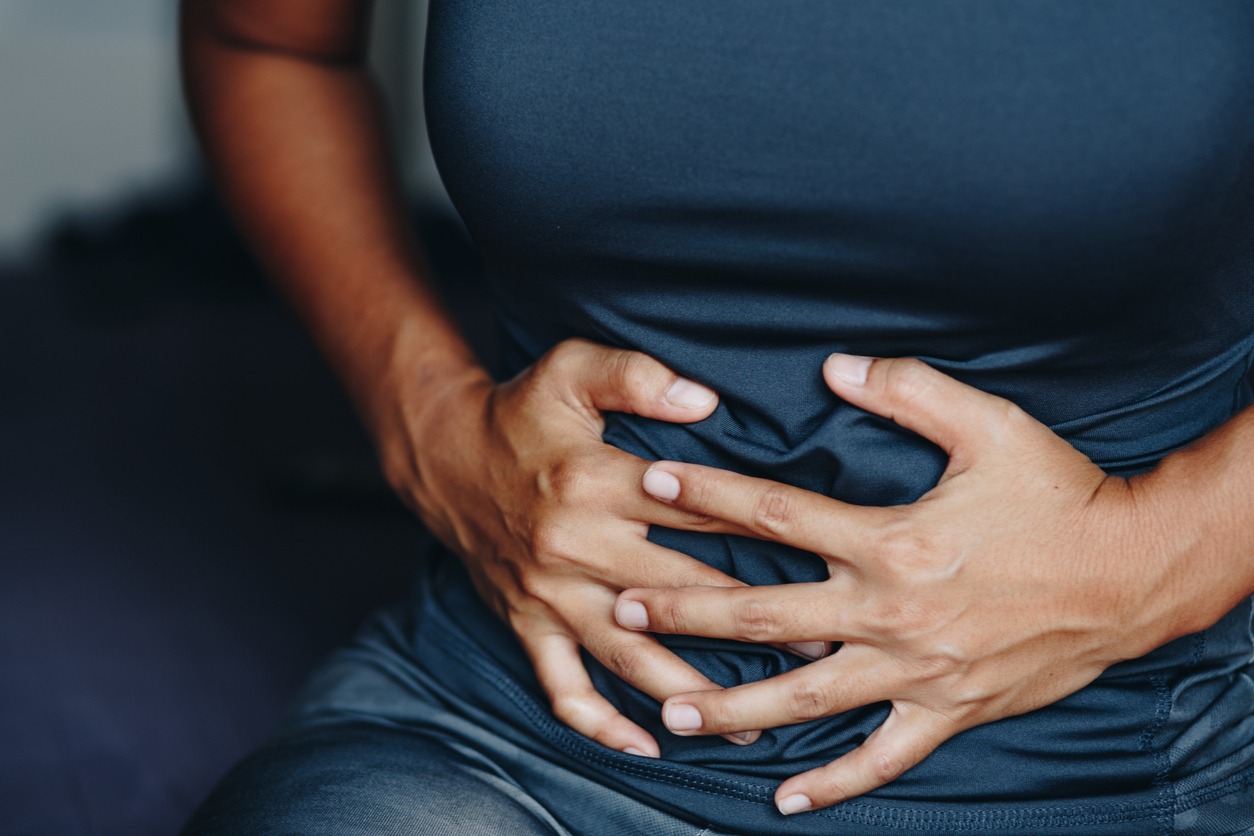It may not be a pleasant subject, but we’ve all experienced excess gas – whether it be our own or someone else’s! Resident dietitian Dr Linia Patel (PhD) RD discusses how to get instant relief from bloating and gas.
At one time or another you have probably felt bloated. Bloating is the sensation of having trapped gas or an increase in pressure in your gut. This can then cause your tummy to swell. Bloating is very common. In fact, it’s normal to feel a bit bloated after a meal. It’s also normal to have some flatulence. Everyone farts. Flatulence is a normal part of digestion that reflects the activity of the bacteria in your gut. The average person can fart anywhere from five to 15 times per day. While passing wind every day is normal, doing it all the time is not. It is excessive if you pass wind more than 20 times per day. When it comes to bloating, for some people bloating is a chronic problem that can coincide with pain and major discomfort.
Five reasons why we bloat
Not moving enough. Regular exercise or simple activities like walking are important for gut health in general. Physical movement also helps the release of the gas, which can build up in your digestive tract.
Eating too much too quickly. Large meals and foods that are high in salt or fat may contribute to bloating by increasing the production and retention of gas and water in your bowels. In addition, eating too quickly, chewing gum or drinking fizzy drinks can also cause excessive amounts of air to be swallowed, which can also exacerbate bloating, especially for people with irritable bowel syndrome (IBS).
An excessive intake of hard-to-digest foods or an intolerance to certain foods. Many people experience bloating after eating certain foods that contain higher amounts of non-digestible or poorly digestible compounds. Dietitians call these foods high FODMAP foods. When you eat these foods, the undigested fibre and sugars end up in your large intestine where bacteria ferment them, leading to increased gas. Conditions like IBS or small intestinal bacterial overgrowth (SIBO) are particularly sensitive to foods like:
- vegetables such as broccoli, cauliflower, cabbage or Brussel sprouts
- fruits such as apples, pears, peaches and prunes
- legumes and pulses
- sugar alcohols and artificial sweeteners found in diet products
- carbonated drinks
- dairy products high in lactose like milk.
Changes in gut bacteria. Did you know that there are more bacterial cells in your body than human cells? To be more exact, there are roughly 40 trillion bacterial cells in your body and only 30 trillion human cells. Most of these bacteria are found in a pocket of your large intestine called the cecum and they are referred to as your gut microbiome. Having the correct balance of bacteria is critical to helping manage bloating.
Constipation. Do you feel that your bloating improves when you open your bowels? This is no coincidence, as when you open your bowels you also release a lot of gas build up. If your bowels are not opening regularly, the foods have longer to ferment as they sit in your large bowel, which means you will produce more gas.
Science-backed ways to reduce bloating and flatulence
While there is no guaranteed way to instantly reduce your bloating or gas, there are some evidence-based ways for you to try that could help to manage the situation:
- Identify the cause. Bloating and excessive flatulence are triggered by many dietary and lifestyle factors, so it is best for you to identify the cause to reduce or eliminate symptoms.
- Use the loo. Relieving some gas or passing stools can help relieve some gas from your gut.
- Wear the right clothes. Wearing tight clothing can add to the bloat, as it adds pressure to the abdomen. Wearing lose clothing provides relief.
- Review your fibre intake. Fibre is a very important component of our diet – particularly if you suffer with constipation. Most of us don’t eat enough fibre at a cost to our health. While every person is different, there should be a focus to meet the recommended daily amount of fibre of 30g. Increase fibre and water intake gradually.
- Reduce your salt intake. Sodium is found in salty foods such as cured and smoked meats, canned foods and sauces. Research suggests there is a link between sodium intake and bloating due to the water retention that reduces gut motility.
- Try a probiotic supplement. Some studies (particularly looking at people who suffer with IBS) suggest that probiotics may aid digestive symptoms like bloating by boosting the number and types of bacteria in your gut. However, this effect seems to only work if you stick to it for at least four weeks and only for some individuals.
- Talk to a dietitian about the low FODMAP process to pinpoint your food intolerances. While it’s tempting to google and try to do it all yourself, the FODMAP diet can be a very restrictive diet and that is why it is best to work with a nutrition expert who can ensure that while you move through the different phases of the programme you are able to maintain a balanced diet.
- Keep track. We all have a unique microbiome so working out what your key triggers are is key. Keeping a food and symptom diary can help with this process and is a really useful tool to take to a dietitian appointment.
Have you checked out Linia’s best-selling online educations?
- Nutrition for Menopause
- Gut Health – the power of the microbiome
- Low Carb: the evidence & application
- Sports Nutrition Basics
- Plant-Based Eating: The Essentials
- Food as Medicine? Food and inflammation
Which one do you fancy?
About the author

Dr Linia Patel has a BSc degree in biochemistry and physiology and has recently achieved a PhD in public health. Linia is a leading dietitian and sports nutritionist. Her passion is translating nutritional science into easy-to-digest and practical advice.
References
- Mari et al (2019), Bloating and abdominal distension: clinical approach and management, Adv Ther., 36(5): 1,075-84.
- Thomas et al (2021), Dietary modification for the restoration of gut microbiome and management of symptoms in Irritable Bowel Syndrome, Am J Lifestyle Med, 10: 16(5): 608-21.
- Sharma et al (2017), Constipation: Pathophysiology and current therapeutic approaches, Handb Exp Pharmcol., 239: 59-74.
- Niu Li H et al, The efficacy and safety of probiotics in patients with irritable bowel syndrome: Evidence based on 35 randomized controlled trials, Int J Surg., 75: 116-27.
- Peng A et al, Effects of the DASH Diet and sodium intake on bloating: results from the DASH-Sodium Trial, The American Journal of Gastroenterology, 114(7): 1,109-15.







